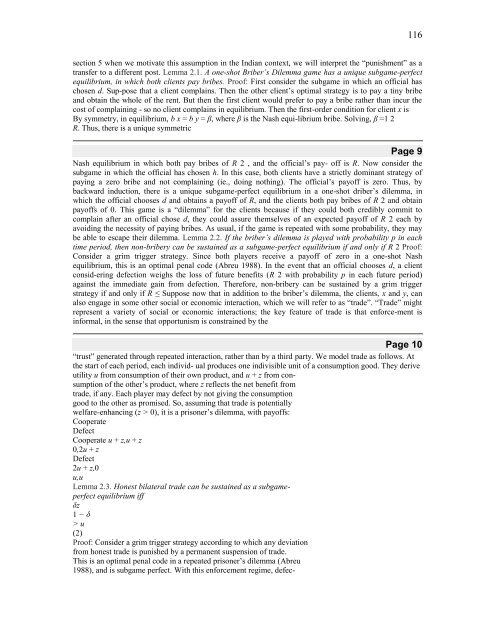FILSAFAT KORUPSI - Direktori File UPI
FILSAFAT KORUPSI - Direktori File UPI
FILSAFAT KORUPSI - Direktori File UPI
Create successful ePaper yourself
Turn your PDF publications into a flip-book with our unique Google optimized e-Paper software.
116<br />
section 5 when we motivate this assumption in the Indian context, we will interpret the “punishment” as a<br />
transfer to a different post. Lemma 2.1. A one-shot Briber’s Dilemma game has a unique subgame-perfect<br />
equilibrium, in which both clients pay bribes. Proof: First consider the subgame in which an official has<br />
chosen d. Sup-pose that a client complains. Then the other client‟s optimal strategy is to pay a tiny bribe<br />
and obtain the whole of the rent. But then the first client would prefer to pay a bribe rather than incur the<br />
cost of complaining - so no client complains in equilibrium. Then the first-order condition for client x is<br />
By symmetry, in equilibrium, b x = b y = β, where β is the Nash equi-librium bribe. Solving, β =1 2<br />
R. Thus, there is a unique symmetric<br />
Page 9<br />
Nash equilibrium in which both pay bribes of R 2 , and the official‟s pay- off is R. Now consider the<br />
subgame in which the official has chosen h. In this case, both clients have a strictly dominant strategy of<br />
paying a zero bribe and not complaining (ie., doing nothing). The official‟s payoff is zero. Thus, by<br />
backward induction, there is a unique subgame-perfect equilibrium in a one-shot driber‟s dilemma, in<br />
which the official chooses d and obtains a payoff of R, and the clients both pay bribes of R 2 and obtain<br />
payoffs of 0. This game is a “dilemma” for the clients because if they could both credibly commit to<br />
complain after an official chose d, they could assure themselves of an expected payoff of R 2 each by<br />
avoiding the necessity of paying bribes. As usual, if the game is repeated with some probability, they may<br />
be able to escape their dilemma. Lemma 2.2. If the briber’s dilemma is played with probability p in each<br />
time period, then non-bribery can be sustained as a subgame-perfect equilibrium if and only if R 2 Proof:<br />
Consider a grim trigger strategy. Since both players receive a payoff of zero in a one-shot Nash<br />
equilibrium, this is an optimal penal code (Abreu 1988). In the event that an official chooses d, a client<br />
consid-ering defection weighs the loss of future benefits (R 2 with probability p in each future period)<br />
against the immediate gain from defection. Therefore, non-bribery can be sustained by a grim trigger<br />
strategy if and only if R ≤ Suppose now that in addition to the briber‟s dilemma, the clients, x and y, can<br />
also engage in some other social or economic interaction, which we will refer to as “trade”. “Trade” might<br />
represent a variety of social or economic interactions; the key feature of trade is that enforce-ment is<br />
informal, in the sense that opportunism is constrained by the<br />
Page 10<br />
“trust” generated through repeated interaction, rather than by a third party. We model trade as follows. At<br />
the start of each period, each individ- ual produces one indivisible unit of a consumption good. They derive<br />
utility u from consumption of their own product, and u + z from con-<br />
sumption of the other‟s product, where z reflects the net benefit from<br />
trade, if any. Each player may defect by not giving the consumption<br />
good to the other as promised. So, assuming that trade is potentially<br />
welfare-enhancing (z > 0), it is a prisoner‟s dilemma, with payoffs:<br />
Cooperate<br />
Defect<br />
Cooperate u + z,u + z<br />
0,2u + z<br />
Defect<br />
2u + z,0<br />
u,u<br />
Lemma 2.3. Honest bilateral trade can be sustained as a subgame-<br />
perfect equilibrium iff<br />
δz<br />
1 − δ<br />
> u<br />
(2)<br />
Proof: Consider a grim trigger strategy according to which any deviation<br />
from honest trade is punished by a permanent suspension of trade.<br />
This is an optimal penal code in a repeated prisoner‟s dilemma (Abreu<br />
1988), and is subgame perfect. With this enforcement regime, defec-

















